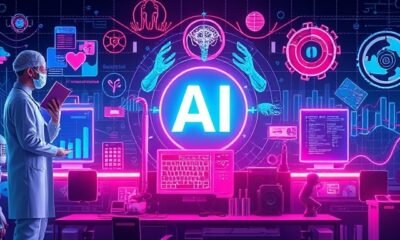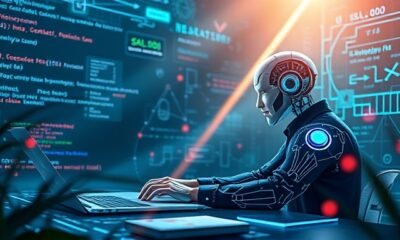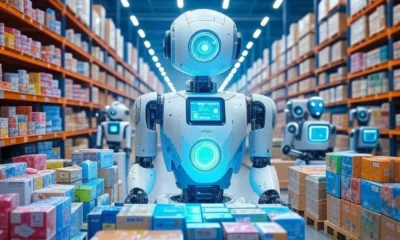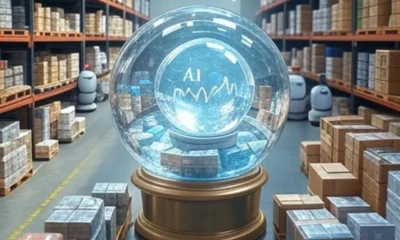Artificial Intelligence
Data Privacy and Security in AI Systems
AI is changing how we live, but it also puts our personal data at risk. In this post, I explore major privacy and security challenges in AI and how we can protect ourselves in a digital-first world.

Everywhere I turn, there is artificial intelligence: in my living room (smart speaker), and in my banking app (fraud alert). However, as convenient as AI is becoming, I found myself wondering, what happens to my personal data?
Definition:
AI system data privacy and security mean responsible handling, processing, and use of personal information.
I am passionate about the way businesses treat my data and what are the dangers of entrusting AI systems to work with my data. AI contributes to the development of business and facilitates life, yet poses grave questions of privacy and digital security. In this post, I will demystify the most important challenges and actual considerations of making data privately and securely held in AI systems. You will find how safeguarding of personal information is not merely a technological challenge- but rather a problem, which affects you and I on a daily basis.
Understanding the Data-AI Relationship:
- AI models are totally dependent on data and it has come to my knowledge that without data, the models cannot learn or get better at all.
All of the AI features that I encounter, such as personalized shopping or predictive texting, are the result of systems that have been trained with huge quantities of data.
What shocked me is that quite often that contains very sensitive information such as my location, preferences, and personal habits. - The kind of data trained in AI systems can be different, and I had an experience of how some of them can be much more personal than others. They may have my name, my phone number, or more likely, my biometric data, such as my voice or my facial characteristics via a phone application. And in most situations, AI systems also work with behavior-based data, such as the way I browse, click, or search the internet on a daily basis.
- This is why the connection between the data and AI is the first key to more powerful data privacy and security.
What are the primary privacy problems of AI systems?
- A significant issue I see is the cases whereby AI gathers my information without explicitly obtaining consent first. Most applications collect data in the background without much notice, and I am not always aware of the information they are utilizing and why. I wonder whether I ever provided actual “consent,” or whether the system simply decided that it would be able to track everything.
- Other issue that I have witnessed is that even anonymized data can account for personal information upon convergence with other dataset. To take a few examples, my browsing behavior on its own might be quite innocent until somebody correlates it with my location data or device data. Such re-identification risk is equivalent to an actual intrusion into my privacy, even in the case of so-called anonymous data.
- Another problem is that AI systems retain data over extended intervals, and I frequently wonder how long my data remains on a company server. Longer the data remains in storage the more it is prone to leakages, breaches or unauthorized access. Transparent data retention policies would be useful, and lots of firms still do not discuss that aspect with users such as me.
- It implies that my data may be shared among companies without my knowledge of how and where it is being utilized. This brings a problem of trust and leaves me wondering about the origins of AI models I am engaging with.
- And, lastly, not all AI uses cases “such as facial recognition” involve such relatively trivial ethical concerns as data storage.
Which are the greatest AI system security risks?
- Such an assault leaves me cautious of the security with which AI stores the information it learns.
- The second risk that I have been introduced to is data poisoning, in which hackers introduce. Corrupt the behavior of AI models by filling them with false information. This might affect actual medical, financial, or law enforcement choices, and that makes me afraid. Manipulation of the AI training data by bad actors renders the whole system unreliable and even dangerous to use.
- And there exists one called adversarial attacks, which deceive AI with minor alterations in input data. This may have severe real-life implications, particularly within such fields as law enforcement or autonomous technology.
What role do laws and regulations in AI data privacy and security?
- The first time I heard about such legislation as the GDPR and CCPA, I felt as though someone was finally watching out for my data rights.
- European law The General Data Protection Regulation (GDPR) began in Europe, but its impact has reached the U.S. and other countries. In the U.S., the California Consumer Privacy Act (CCPA) can protect individuals similar to me.
- However, laws dedicated to AI are yet to match up, and I personally have observed that the majority of the existing regulations fail to
In my opinion, we should have more specific regulations which deal with AI itself, rather than with general data practices.
Why is privacy and security important in developing ethical AI?
- My fear is that too many people think AI responsible construction begins with good coding or effective algorithms. When developers fail to thinking about privacy at the beginning of the process then it is me who bears the risk. Ethical AI involves prioritizing people, and in particular prioritizing our most sensitive data.
- A large component of ethical AI is transparency, and I should be able to know how and why systems are utilizing my data. So, when companies are open about their AI and do not conceal it in extensive privacy policies, I am more willing to use them. It establishes trust, which I believe, is as valuable as any technicality a downloaded app can provide.
- Another ethical challenge related topic is bias, and I have experienced the prejudiced AI models may discriminate or marginalize specific groups. Without creating an AI system that learns on perfect and complete data, there is a possibility that the people like me will be treated unfairly without even knowing it. Making this right is not only a technical problem, but also an ethical one on the part of whoever develops AI systems.
- Ethical development also translates to restricting the amount of data collected and using only that much which is so imperatively needed in the task. It is also nice when companies require less information, rather than collecting everything in case they might need it.
How can companies improve AI systems data privacy?
- One of the things I seek is whether a business operates privacy by design, meaning they security as an initial consideration. I would feel more comfortable using products of companies that consider privacy on the first day of developing AI systems. They do not merely attach security- they consider it as an ingredient of the technology.
- I also prefer when companies just take the information which is absolutely necessary, rather than taking everything they can. Such a concept of data minimization can minimize risks to individuals like me whose data is at stake. By not storing it, they can never lose it and that is a straightforward yet effective fact.
- Routine audits and testing assist organizations in identifying vulnerabilities prior to their escalation into full-fledged breaches or scandals that cost organizations huge sums of money. I would like the businesses to monitor how their AI systems handle my data, and not simply put them into operation and forget about them. It is a means of keeping accountable and ensuring that privacy policies are not just on paper.
- Finally, I believe that training of the employees is very important since it can ruin the best system when individuals do not practice good habits. Educated staff knows how to safely handle data, which can protect all of them, particularly customers, like me.
What can we peoples do to safeguard our information in the AI-centered world?
- This is the first thing I would always do, read the privacy settings of any app or AI tool before using it. Most platforms allow me to restrict data collection but require me to take time and customize them. I can prevent apps form accessing excess data by disabling the toggles of the permissions that are not required.
- Another habit I have adopted is not to share excess personal data on the Internet, particularly when registering a new service or using AI-based tools. When I am not required to provide my birthday date or phone number I tend to leave that field blank. Less I post, the less information companies need to keep- and that would translate to fewer risks on my part in future.
- It provides a higher level of the security in the event that someone attempts to log in to my account without my authorization. Finally, I attempt to follow AI tendencies, news, and possible data threats that may impact individuals similar to me. More I learn about AI functioning, the more appropriate decisions I can make to secure my digital life.
Conclusion:
By now, I understand that data privacy and security in AI systems are something that touches each one of us, including me. AI is strong and useful, and without precaution measures, it may easily overstep the boundary and harm us. This is why I think that our information should be kept secure with the help of good morals, good legislation, and better judgments.
Responsibility of companies to safeguard the data collected with the help of AI is enormous, and I hope they can show better performance. Simultaneously, I have also found out that I can play a part in regulating my online presence and posing hard questions.
Businesses, lawmakers, and users, including me, can work together and create a safer future of AI and data privacy. Do you have trust in AI tools that you are using daily? What is one thing that you would like companies to improve on in regards to your privacy?
-

 Artificial Intelligence8 months ago
Artificial Intelligence8 months agoHow to Use Grok AI: A Complete Guide
-

 Artificial Intelligence10 months ago
Artificial Intelligence10 months agoWhat is Artificial Intelligence? A Comprehensive Guide for Businesses and Enthusiasts
-

 Artificial Intelligence9 months ago
Artificial Intelligence9 months agoUnlocking the Power of Artificial Intelligence Tools
-

 Artificial Intelligence9 months ago
Artificial Intelligence9 months agoWhat is DeepSeek? Revolutionizing AI with Cutting-Edge Solutions
-

 Artificial Intelligence5 months ago
Artificial Intelligence5 months agoAI Technologies in Warehouse Automation:
-

 Artificial Intelligence5 months ago
Artificial Intelligence5 months agoPredictive Analytics for Demand Forecasting:
-

 Artificial Intelligence6 months ago
Artificial Intelligence6 months agoMeta’s AI Push: The Standalone Assistant App Set to Rival ChatGPT
-

 Artificial Intelligence5 months ago
Artificial Intelligence5 months agoHow Artificial Intelligence is Revolutionizing Logistics:


